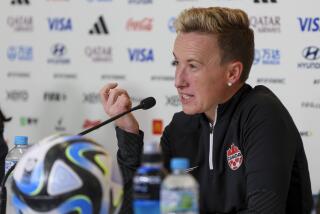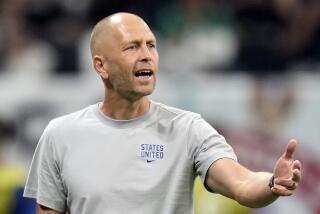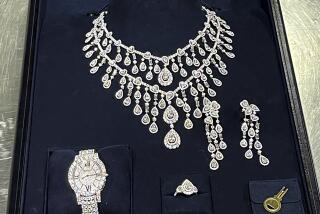FIFA President Sepp Blatter faces growing pressure to resign
Embattled FIFA President Sepp Blatter took a pounding Thursday from politicians and sports figures, many of whom called for his resignation amid the far-reaching corruption scandal hitting the soccer world.
Blatter, however, gave his critics no quarter and appeared poised to fight on.
As he took the stage at the opening of FIFA’s annual Congress in Zurich, he maintained an air of implacability, distancing himself from the 14 men indicted on bribery-related charges.
“The actions of individuals bring shame and humiliation on football and demand action and change from us all,” he told delegates at a music-themed ceremony that kicked off the governing body’s event. “We cannot allow the reputation of football and FIFA to be dragged through the mud any longer.
“I know many people hold me ultimately responsible,” he said, but “I cannot monitor everyone all the time.”
A FIFA election scheduled at the organization’s headquarters Friday morning, in which Blatter, 79, of Switzerland is pitted against the upstart candidate Prince Ali bin al Hussein of Jordan for the presidency, is expected to go on as planned. Blatter is favored to win a fifth four-year term despite the scandal.
The U.S. Department of Justice on Wednesday brought a 47-count indictment against FIFA executives and those they do business with on charges of racketeering, wire fraud and money laundering, alleging that officials had taken more than $150 million in bribes. A parallel investigation has been launched by Swiss authorities over FIFA’s awarding of the World Cup host status to Russia in 2018 and Qatar in 2022.
Blatter’s remarks came at the end of an often surprising day, with Europeans welcoming a U.S. intervention and even the Conservative and Labor parties agreeing in Britain. Left-leaning members of Parliament struck out hard against Blatter, and British Prime Minister David Cameron and Conservative Culture Secretary John Whittingdale called on the FIFA leader to step down.
Meanwhile, French Foreign Minister Laurent Fabius said he wanted the election postponed.
Visa became the loudest voice among a group of FIFA sponsors, a group historically less likely to rattle the cage, to criticize the organization. In a statement, the credit card giant said it would “reassess our partnership” if “swift and immediate steps to address these issues” weren’t taken, though it did not name Blatter specifically.
Michel Platini, the France-born head of the
European soccer federation UEFA and a longtime Blatter critic, made a strongly worded plea for change.
“We cannot continue like this,” he said at a news conference Thursday, suggesting that patronage was keeping Blatter in power.
The scandal has highlighted the polarizing power of Blatter, who over his 17 years at the helm of FIFA has built a multibillion-dollar empire that is the envy of many executives, but has also drawn frequent criticism for a stern and secretive style.
Despite the outcry by a number of delegates from larger soccer nations, each of the 209 FIFA member associations receive an equal vote at the election, and it’s difficult to predict how the tally will break down.
The largest number of FIFA members come from the Africa contingent, which, with 56, holds two more votes than Europe, and Blatter is seen as popular on that continent. The Asian federation, which pledged support to Blatter on Thursday, is third with 47 votes.
Blatter seemed to be appealing to the FIFA swing vote and public sympathy in remarks Thursday that suggested a need for stricter enforcement of the law.
“It must fall to me to be responsible for the well-being and reputation for our organization and to find a way to fix things,” he said.
To critics, the statement of accountability sounded like FIFA’s business-as-usual approach of shunning outside oversight.
Other variables remain in play in the election. They include members who might feel it’s time for a change after this week’s embarrassing headlines, and, at the other end of the spectrum, some who believe the charges are an unwanted American intrusion.
The investigation came to light Wednesday via surprising early-morning arrests at the Baur Au Lac, an upscale hotel in central Zurich, in which FBI agents paid visits to a number of FIFA executives, with one even hustled out a side entrance hidden by a bedsheet.
The mood Thursday at the Baur Au Lac was convivial, with little sign of the drama of the day before. Representatives of national associations mingled on a restaurant terrace to eat, drink and backslap with old colleagues. There were few signs of the security that locked down the hotel Wednesday.
But conversations about Blatter could be heard at meals and in lounges, and Cameron’s position was called out on more than one occasion.
If Blatter were to remain in office, it could set the stage for more turmoil, especially as the case continues against the 14 who have been indicted. U.S. authorities say that prosecution of FIFA is just beginning, and Swiss authorities have only begun sifting through materials in their investigation.
Coupled with a strong backlash against Blatter from soccer’s highest ranks, his reelection could set the stage for boycotts or other fissures within FIFA.
Platini said he planned a meeting of UEFA members next weekend in Berlin, the site of the Champion’s League final, on the federation’s participation in FIFA events. He did not rule out the possibility of boycotts.
Chris Bryant, a Labor member of the British Parliament, suggested that if the World Cups went ahead in Russia and Qatar, other football associations should consider breakaway events at those times.
But Russian President Vladimir Putin described the investigations as “yet another evident attempt to derail Mr. Blatter’s reelection” and introduced a geopolitical element when he said that the U.S.-led arrests had an ulterior motive — to throw into question Russia’s host status.
Some skeptics, however, said that many of those speaking out had a stake in the matter. Russia was named a host country, but tournament bids by both England and the United States were denied.
More to Read
Sign up for Essential California
The most important California stories and recommendations in your inbox every morning.
You may occasionally receive promotional content from the Los Angeles Times.











